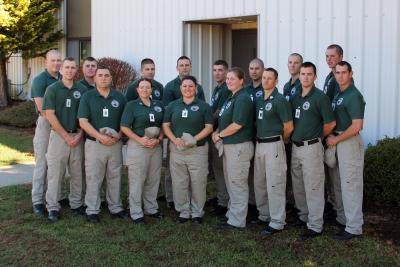|
|
|
Natasha Arnold (right) of Rockville, Md., shakes hands with Dr. Don Tomas, SCC president, Nov. 18 in Franklin. In the background is Curtis Dowdle, SCC's dean of public safety training. Arnold was one of 17 graduates of the National Park Service’s Seasonal Law Enforcement Training, which was coordinated by the Public Safety Training Center of Southwestern Community College. |
Exposure to “pepper spray” is always miserable for everyone who undergoes the National Park Service’s Seasonal Law enforcement Training (NPS-SLET) program.
For Natasha Arnold, an entirely different – and completely unplanned – experience is what came closest to knocking her out of the 91st NPS-SLET class at Southwestern Community College’s Public Safety Training Center.
While running some sprints, she tore a tendon/ligament in her right foot.
“I was worried that maybe I’d hurt myself to the point where I was going to have to recycle back through the class,” recalled Arnold, an Army veteran who’d taken unpaid leave from her post as an interpretive park ranger at the National Mall in Washington, D.C., to undergo the training in Macon County.
The Rockville, Md., resident battled through the injury and not only graduated but was recognized for her service as class corporal at the Nov. 18 commencement ceremony.
She’s now hoping to find a law enforcement job within the NPS.
“I had the opportunity to mentor under a few amazing law enforcement park rangers, and I realized that just the education side wasn’t challenging enough for me,” she said. “When you do law enforcement, you still get to do the education. You still get to do the search and rescue, the fire, but you’re also like the tip of the arrowhead. If somebody’s messing with our ecological resources, you get to be the person who does the investigation and stops it.”
Arnold is one of 17 graduates from across the country who are now qualified to work as seasonal (Type II) commissioned Law Enforcement Rangers.
 |
|
Graduates of the National Park Service’s Seasonal Law Enforcement Training, which was coordinated by SCC's Public Safety Training Center, include, front row, from left: Thomas M. Lanik (Inner Grove Heights, Minn.), Miles H. McCall (Odessa, Texas), Natasha M. Arnold (Arlington, Va.), Mary B. Tiemann (Inner Grove Heights, Minn.), Jill C. Paxton (Marietta, S.C.), Nathan L. Axton (Virginia Beach, Va.), Michael A. Lyon (Pryor, Okla.) and Joshua M. Fulgium (Edmond, Okla.). Rear Row: Taylor E. Barker (Lebo, Kan.), Robert F. Kraus (Moorehead City), Vassili N. Mironov (Palm Coast, Fla.), Justin T. Eikenberry (Alpharetta, Ga.), Nicholas J. Camechis (Loxahatchee, Fla.), Matthew P. Tiger (Clyde), Jared H. Thompson (Boone), and Andrew N. Dellett (Manhattan, Kan.) Not Pictured: James R. Burger (Maryville, Tenn.). |
"Corporal Natasha Arnold brought distinguished service experience within the United States Army to her assigned training session,” said Mitch Boudrot, Law Enforcement Training Program Director and Instructor at SCC. “She embodies organization, commitment and motivation, both within her personal life and through her delegated duties as Class Corporal - ensuring that members of NPS-SLET No. 91 reflected professionalism, attention to detail and team cohesiveness. It has been a pleasure to work with Cpl. Arnold and every recruit of NPS-SLET No. 91 in the completion of the training session as they aspire to enter the noble profession of law enforcement."
Every member of the class had to pass a variety of tests - ranging from physical, mental and emotional to academic - before graduating.
The class member who traveled the farthest, Miles McCall of Odessa, Texas, said experiencing Oleoresin Capsicum (or OC, commonly known as pepper spray) was easily the toughest aspect of training for him to endure.
“It stays with you a few days,” said McCall, who was previously posted at Padre Island National Seashore in South Texas. “I convinced myself that since I’m from Texas and like hot food that the pepper spray wouldn’t be as bad. That was not correct.
“It feels great to have made it to graduation,” McCall added. “There were times when you didn’t know if you were going to make it through or not. To finally get here, it feels good.”
For more information about Southwestern’s Public Safety Training Center, call 306-7041 or visit http://www.southwesterncc.edu/content/public-safety-training.

